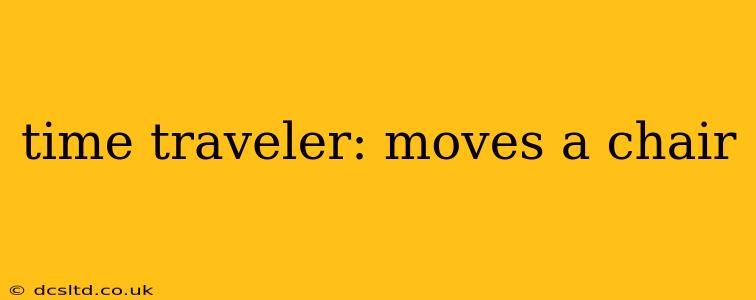The Butterfly Effect and a Moved Chair: Exploring the Paradox of Time Travel
The very notion of a time traveler subtly altering the past, such as moving a chair, sparks endless debate and philosophical quandaries. While the image of a time traveler casually rearranging furniture might seem trivial, it highlights the core paradoxes inherent in the concept of time travel itself. This seemingly simple act opens a Pandora's Box of questions regarding causality, the multiverse theory, and the very nature of time itself.
What if a time traveler moved a chair in the past? Would it create a paradox?
The classic example of a time travel paradox is the "grandfather paradox," where a time traveler prevents their own birth. Moving a chair, while less dramatic, presents a similar challenge to established causality. If the chair's position is altered in the past, and that altered position has unforeseen consequences – perhaps preventing a crucial meeting, causing a different chain of events that lead to a completely different future– we have a paradox. The original timeline, where the chair was in a different location, is now seemingly erased or irreconcilable with the new altered timeline.
Could moving a chair change the future in a significant way?
The answer is potentially yes, but with caveats. The extent of the change depends entirely on the butterfly effect. This theory proposes that even the smallest action in the past can have enormous and unpredictable consequences in the future. Moving a chair might seem inconsequential, but it could, theoretically, prevent a collision, change a course of events in a seemingly unrelated occurrence, or alter the social structure in some way. It is impossible to predict with certainty how such a minor change would ripple through time.
What are the different theories on how time travel might work, and how would they affect the chair-moving scenario?
Several theoretical frameworks attempt to explain time travel, each impacting our chair-moving scenario differently:
-
The Many-Worlds Interpretation: This theory posits that every quantum decision creates a branching timeline. In this case, moving the chair wouldn't alter the original timeline but would create a new, parallel universe with a different timeline where the chair's position is different.
-
The Novikov self-consistency principle: This principle suggests that time travel is inherently self-consistent; any paradoxes are prevented by the laws of physics. According to this theory, the time traveler would only be able to move the chair if it was already in the new position. The action itself would be self-consistent within the existing timeline.
-
The Causal Loop: This concept suggests that time travel creates closed loops where the past, present, and future are all intertwined, and events cause themselves. Moving the chair might be part of a closed causal loop, where its new position was already always meant to be there.
Would the time traveler remember their actions? How might this affect their future?
This depends on the nature of the time travel. If the traveler returns to their own timeline, their memory of moving the chair would be a part of their personal history. However, depending on the model of time travel, the consequences of this action could drastically alter their own future, potentially even erasing their memory of the event if the changes to the timeline are significant enough.
Is it possible to test these theories?
Unfortunately, we currently lack the technology to test these theories definitively. Time travel remains firmly in the realm of science fiction and theoretical physics. However, the thought experiment of a time traveler moving a chair helps us explore the fundamental questions surrounding time, causality, and the nature of reality. The seemingly simple act of moving a chair throws the very fabric of our understanding of time into sharp relief, highlighting the complexities and paradoxes inherent in the very concept of time travel itself.
